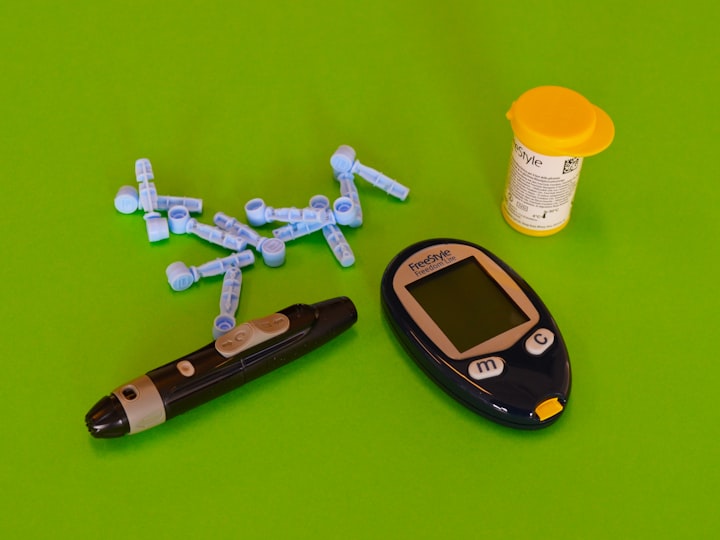5 things to remember when you go to the doctor
How to get the most out of your visit

Disclaimer: The information provided in this article is based on my experience and knowledge and does not constitute medical advice. It should not serve as a substitute for advice from your primary care provider or other licensed medical professionals.
No one likes going to the doctor, and I am no exception. They say nurses make the worst patients, and it's true. Despite my career shift over into health and wellness freelance writing, the residual effects carry over. But through my time in the field, I've picked up a few things to help others through doctor visits.
No matter who you are, you will likely end up at a doctor's office at some point in your life. Keep the following tips in mind to get the most out of your visit:
1. Do your homework
Whether you're a new or old patient, you can bet the doctor you are seeing is doing his or her homework on you. Doctors will review your health history, your medications, past lab work, and why you have sought medical care in the past.
It's only fair for you to do your research too. If this is your first time seeing a new provider, do some research to learn about the doctor's history and medical background. Where did he graduate from? How long has she been practicing?
If you know of other people who have been to the same provider, ask them about their experience. But remember to keep an open mind. Just because one of your friends had a bad experience doesn't mean the doctor is unqualified to help you.
2. Be prepared with your questions, and be ready to share information
It's important to pin down the purpose of your visit. For example, maybe you are getting ready for your annual physical. Visits like this are a good time to ask questions about your health and go over any changes since your last visit.
It can be helpful to start a list of the questions you want to ask at your appointment. You can make this list on-going and add questions to it when you think of them. Writing down your questions makes you less-likely to forget them during your appointment.
If you have a new health problem, try to be as thorough as possible in the information you provide. For example, let's say you are going to the doctor about pain management. Try to let the doctor know when the pain started, what the pain is like, what treatments you have tried, and what factors make the pain better or worse.
Note: Be prepared with your paperwork when you go to your appointment as well. For example, bring a list of your current medications and your insurance information. Components like this are part of sharing critical health information with your healthcare team.
3. You are responsible for your health
At the end of the day, your health is your responsibility. You can take steps to take care of yourself and be proactive about your health. Doctors and medical professionals can give you all the advice in the world, but it comes down to you to put in the work.
For the diabetic, a doctor can prescribe insulin and help you plan a healthy diet. But you have to put in the work and follow through.
We often view doctors as the people who can "fix it," but many health problems are complex and require multiple management strategies. Think about going to the doctor as part of how you can take care of yourself. They can help you with treatments and give you expert advice, but you have to do the legwork. You have to take the medication, go to therapy, or undergo surgery. Your treatment is your choice, and your doctor can help you decide on the best options.
4. You are consulting an expert.
It is important to remember that a doctor is a medical professional with a medical degree. And no number of google searches can make up for actually getting a medical degree. Of course, this doesn't mean the doctor is always right. Any doctor can make a mistake or miss critical information.
Respect goes a long way, no matter your background. For example, it's easy to assume you know more than the doctor, particularly if you have a medical degree. This attitude can lead to rudeness and disrespect towards the doctor. But when you go to the doctor, you are consulting with an expert to improve your health. Remember to be kind and respectful, even if you disagree with the doctor's recommendations.
Note: On the flip side, you do not have to put up with disrespect from a doctor or provider. Being an expert does not give the doctor the right to treat you disrespectfully.
5. You have options
You don't have to continue going to the same provider. It's okay to shop around. Don't feel like you have to continue going to the same doctor because it's who you've always gone to. If the doctor isn't giving you what you need, it's okay to try going to someone else.
But there can be a variety of reasons for you to switch providers. Maybe you are about to move. Other times you need to consult with someone who is more specialized. It's also okay to switch providers if you don't think the doctor is a good fit for you.
It's okay to leave, particularly if you feel that the doctor isn't respecting you, taking your health problems seriously, or is offering conflicting medical advice. However, don't make a provider switch quickly. For example, try at least a few visits with a doctor before you decide you and the doctor don't work well together.
Note: If a doctor misdiagnoses you or offers medical advice that you can verify is untrue, you should seriously consider switching providers or getting a second opinion.
Take the next step in your health
As you get ready for any doctor's visit, remember that health is a journey. Wellness is a spectrum. Often it's not easy to take steps to take care of ourselves.
It's nerve-wracking to make an appointment. It's annoying to follow up with treatment recommendations. But putting in the hard work means that you are taking charge of your health and well-being. You can do it!

Note: I used the terms "provider" and "doctor" interchangeably in this piece, but I do want to acknowledge that not every provider is a doctor and that there are many health care professionals that make up the healthcare team.
Thanks for reading. If you liked what you read, consider subscribing, pledging, or giving a tip. If you would like to receive regular updates on my work, please email me at [email protected] and ask to be added to my email list.
You can also follow me on Medium.
About the Creator
Jessica Freeborn
Passionate writer that is enthusiastic about writing engaging, compelling content. Excels in breaking down complex concepts into simple terms and connecting with readers through sharing stories and personal experience.
Reader insights
Outstanding
Excellent work. Looking forward to reading more!
Top insights
Eye opening
Niche topic & fresh perspectives
Excellent storytelling
Original narrative & well developed characters
Expert insights and opinions
Arguments were carefully researched and presented
Heartfelt and relatable
The story invoked strong personal emotions






Comments
There are no comments for this story
Be the first to respond and start the conversation.